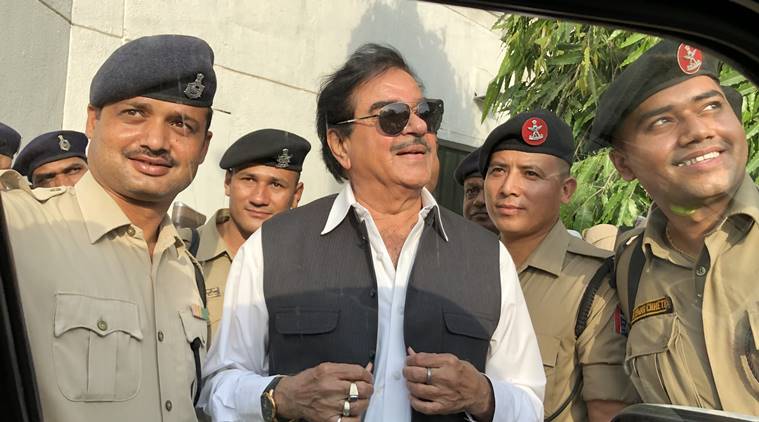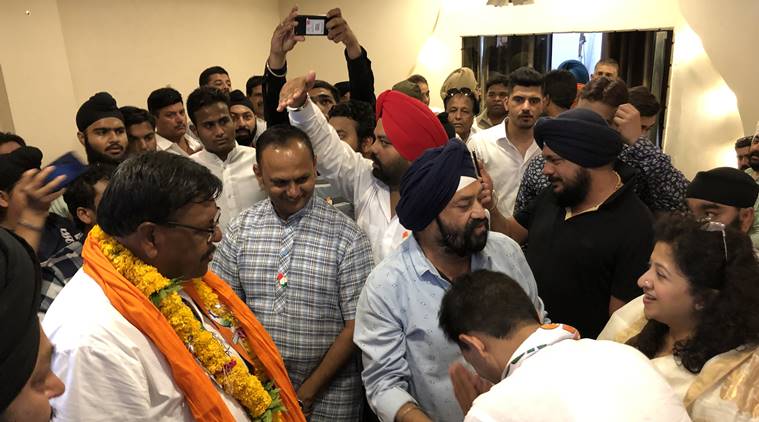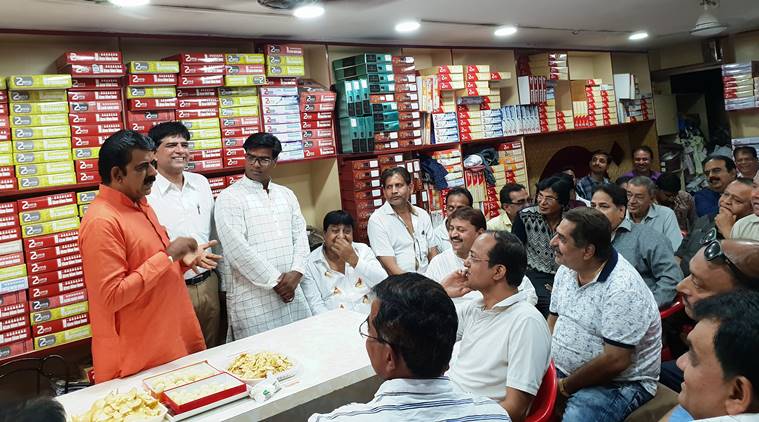
It costs Rs 20 to enter Patna’s three-year-old Eco Park which is divided into two distinct areas: One for families and children to play on swings, trampolines, slides and rope ladders, and another, where the lights don’t work. Here, young couples embrace on benches or behind bushes in the park’s darkest corners.
I retreated to the family area to get a sense of how the Patna Sahib constituency was likely to vote. In this part of the country, people seem especially happy to strike up a political conversation. And whether it’s at the park, in rural Bihar, or the conversations I had with lawyers inside the illegal chambers — neatly constructed underneath the flyover, a few yards away from the Patna High court — most suggest a Ravi Shankar Prasad victory.
But you don’t need such conversations to tell you that Patna Sahib — an 80 per cent urban constituency spread over 40 km — is a safe seat for the BJP. You just need to compare the energy in Ravi Shankar Prasad’s campaign to that of the Congress party’s candidate Shatrughan Sinha.

The Indian Express’s Patna correspondent Santosh Singh describes Sinha best: A man who is confusing selfie requests for votes. The actor left the BJP in a sulk, only a few months ago, having won the past two terms from Patna Sahib on a BJP ticket.
Lok Sabha debutant Ravi Shankar Prasad — who was born to a well-known lawyer in Patna and is currently the country’s law and IT minister — isn’t taking any chances. He’s visiting almost every village that his team asks him to, holding jan sabhas for as few as 100 people, stopping for baithaks at every cluster of 25-40 people.
Prasad is a seasoned orator: Every speech of his connects. At the first village we stopped, he asks people, How many are on Facebook and WhatsApp? Around half of them raise their hands. “Shabhash,” he says, proceeding to credit his government for empowering them with data in the digital age.
He mentions various national schemes, the work of the BJP’s alliance partner, Nitish Kumar, with respect to schools, roads and power, and also that of Ram Vilas Paswan to subtly display the formidable caste arithmetic his alliance offers.
But one wonders why every speech of his carries a mention of national security: Asking people to vote in the name of soldiers. “Is chunav ka mudda hai — kya aapko shahidon ki shahadat ka saboot chahiye, ya Bharat Mata ke suput chahiye? Yeh aapko tay karna hai. (Do you want to vote for those who ask our armed forces for proof of their sacrifice, or do you want to vote for the brave sons of Bharat? This is the decision you have to make)”.
Based on the uniformity of the audience’s response across all his meetings, this query seems to draw the biggest applause.
And that frightens me.
What our services need is an upgrade across the board — men, women and material (including fighter aircraft). What they do not need is the message that military action can be used by the political establishment to reap an electoral harvest.
***
MY TRAVELS ACROSS THE COUNTRY, during this election, have reinforced one trend that I had begun to ponder on well before the election process started: This will be India’s first election where women have their say. Issues such as Sabarimala, triple talaq, Me Too, demonetisation, Ujjwala and toilets, have activated political opinions of women who — up until now — generally voted in line with their family preferences.
Consider Sabarimala — an issue that 15 years ago would have been confined to the region, today elicits impassioned opinions from women across the country. Our Marathi daily’s website — loksatta.com — had thousands of comments from women on Sabarimala. I won’t hazard a guess on their politics but that they are speaking their mind will change the perception that families (or even small towns, for that matter) vote as a unit.
So the political activation of women in this election could throw long-held assumptions out the window: That Muslim and Yadav women would vote for the RJD, or that Brahmin women in Eastern UP would vote for the BJP. Given the unsurprising hesitation of any voter (even more so, one voting differently from her family) to publicly divulge her politics, I wonder if our pollsters have been able to capture this.
***
IRRESPECTIVE OF THE CONGRESS’S TALLY this evening, I don’t think any number can absolve the party of the pressing need for a long hard look in the mirror.
And for various reasons.
First: Shockingly little has changed in the Congress that delivered 44 seats in 2014 and the Congress that went into this election.
The party has had a confused, disorganised campaign and has failed on multiple opportunities to pick fights with the BJP. Rafale was a rare (and surprising) exception to an otherwise poor communication effort that stalled before it could really take off.
Second: Even at 44 seats, the Congress is the second largest political party by popular vote. In 2014, the Congress brand still pulled 10.7 crore of the 55 crore votes across the country. These are people who have an affinity for a legacy, and for a national brand that’s taken decades to build.
It’s a legacy that deserves a leadership that can script a single, clear message. And that message has to be more powerful than “Defeat the incumbent”.
Because, third: With the current management, money bags in Mumbai and Delhi don’t want (or are, maybe, even too scared) to fund the Congress party. It forces the broke party to put up lacklustre candidates whose most attractive qualification is the ability to fund their own campaigns.
Like the Congress candidate from Indore businessman Pankaj Sanghvi. This is a seat that Sumitra Mahajan’s (curious last-minute) withdrawal could have been a good fight between the BJP and the Congress. It has been reduced to a near walkover for the BJP. In the car with Sanghvi, it’s clear that it’s Madhya Pradesh’s young education minister and MLA Jeetu Patwari who’s in the driver’s seat. He is the kind of career politician who knows almost every person and their families in his district by name.

If you notice, whenever the Congress loses, most of the decision-makers in the party go back to their day jobs — lawyers, economists, academics, authors or businessmen. Compare this with the political instincts built into the BJP’s establishment: Amit Shah, Narendra Modi, Rajnath Singh and others have been through the rough and tumble of politics and have over the years cultivated an intuitive sense of what works on ground.

With Rahul Gandhi floundering, the party may need to come up with an answer for its workers as to its plans for Priyanka Gandhi. The evidence is limited but she shows a political instinct that few with lineage (especially in their 4th generation) have. In fact, if you take a look at all the next generation inheritors of political legacies — Aditya Thackeray, Abhishek Banerjee, Lokesh Naidu, K T Rao, Pankaj Singh, Jayant Chaudhary, Nakul Nath or Supriya Sule — few have displayed the ability so far to fill their patriarch’s oversized shoes. Perhaps, only Jagan Reddy, and Akhilesh Yadav and maybe Tejashwi Yadav have fought battles within and mobilised their own rank and file.
It’s an indelicate comment, and I can relate to the unique challenge that comes with a prominent last name which does not allow the next generation the luxury of learning from its own mistakes. Most of these stalwarts were the product of transformative movements in contemporary history — the Emergency and Mandal. There isn’t any such national development that has motivated this generation.
And fourth, if 44 seats couldn’t lead to an introspection, what will? Even if we consider the most generous numbers given to Congress — MyNeta’s 130 for UPA — that should not give the party a licence to continue to maintain status quo. Because the Congress must know that this will only make its talented members look out for “me, myself and I”. As Madhya Pradesh MLA Jeetu Patwari told a voter during the 2018 assembly election campaign: “Aapko sirf meri izzat rakhni hai,” he said. “Party gayee tel lene (You must vote for me, forget the party that I represent)”. He may just be right.
The writer is executive director, The Indian Express Group